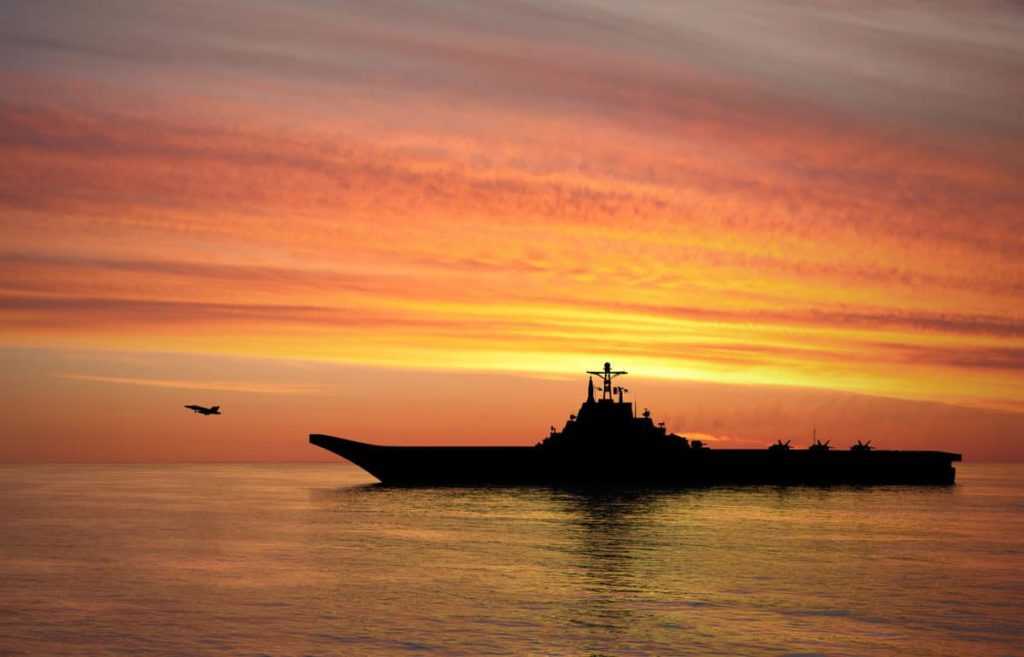Iran subverts international law amid virus outbreak
The Iranian leadership continues to take advantage of the COVID-19 crisis, more recently in the form of military escalation. On April 15, US Naval Forces Central Command (NAVCENT) reported 11 small vessels belonging to Iran’s Revolutionary Guards Corps (IRGC) Navy directed “dangerous and harassing approaches” towards a fleet of US ships in the Persian Gulf.

Aircraft carrier on sea at sunset
Originally published by The Times of Israel
The Iranian leadership continues to take advantage of the COVID-19 crisis, more recently in the form of military escalation. On April 15, US Naval Forces Central Command (NAVCENT) reported 11 small vessels belonging to Iran’s Revolutionary Guards Corps (IRGC) Navy directed “dangerous and harassing approaches” towards a fleet of US ships in the Persian Gulf.
“The IRGCN’s dangerous and provocative actions increased the risk of miscalculation and collision, were not in accordance with the internationally recognized Convention on the International Regulations for Preventing Collisions at Sea (COLREGS) “rules of the road” or internationally recognized maritime customs, and were not in accordance with the obligation under international law to act with due regard for the safety of other vessels in the area,” NAVCENT officials said in a statement.
In response to this harassment, President Trump tweeted on Wednesday that he has instructed the U.S. Navy to “shoot down and destroy any and all Iranian gunboats if they harass our ships at sea.” Both – Deputy Defense Secretary David Norquist – and General John Hyten, the vice chairman of the Joint Chiefs of Staff, demonstrated their support for the President’s warning.
Iranian harassment of U.S. ships in the Persian Gulf mostly ceased in 2017 and are not unprecedented. Harassing U.S. Navy ships with Iranian gunboats was a problem during the Obama years and continued after the 2015 nuclear deal was announced. The Persian Gulf has been the backdrop for military conflicts and tensions between the U.S. and Iran for decades. Regime leaders consistently threaten to block off the Strait of Harmuz, the world’s single most critical oil passageway, in response to US sanctions. Last year, the US collaborated with partner nations to establish a mission in Bahrain devised in part to block Iranian seizure and attacks on commercial ships.
As Iran’s economy continues to shrivel in response to the pandemic and international sanctions, regime leaders will likely subvert international law further in an attempt to gain sanctions relief through political pressure as well attempting to divert Iranian public opinion.
However, Iran’s key military apparatus, the Revolutionary Guard, has suffered near-fatal blows economically and personnel-wise in the last year alone. Back in January, the Guard was left without their most prominent commander, Maj. Gen. Qasem Soleimani, following a successful U.S. drone strike. Just weeks later, coronavirus began to infect and kill off dozens of top officials and politicians in Iran, including a senior commander of the IRGC, Nasser Shabani.
Amidst the rogue state’s weakening economic posture, the Guard announced ai successful launch of the country’s first military satellite into orbit this week. This was the first successful satellite after a string of failures. In February, Iran failed to put its Zafar 1 communications satellite into orbit to celebrate the 40th anniversary of the founding of the Islamic Republic of Iran.
Secretary of State Mike Pompeo denounced the recent rocket launch, indicating it was inconsistent with a 2015 United Nations Security Council resolution which prohibits Iran from working on ballistic missiles for up to 8 years.
The Iranian regime’s situation continues to go from bad to worse as the ongoing economic sanctions and the deadly impact of the pandemic undermines its possible survivability. Hostile actions at sea and military adventurism like the satellite launch will likely increase.
- America’s Supercarriers Are Back in Force in the Pacific - December 30, 2025
- Israel’s $2 Iron Beam Laser Could Disrupt Missile Warfare - December 23, 2025
- US Stands Up New Drone Strike Force in the Middle East - December 9, 2025
